Reflective Analysis: Applying Driscoll's Cycle to a Nursing Experience
VerifiedAdded on 2022/10/06
|9
|2267
|21
Report
AI Summary
This report presents a nursing student's reflective analysis of a clinical placement experience, structured around Driscoll's reflective cycle. The student recounts a situation involving a needle stick injury during an insulin injection, highlighting the challenges of adhering to safety protocols and the ethical dilemmas encountered when faced with conflicting instructions from a senior nurse. The 'What?' phase details the incident, including the student's oversight in not having a sharps container and the subsequent recapping of the needle. The 'So what?' phase explores the student's emotional response, the breach of safety guidelines, and the ethical implications of the senior nurse's actions, particularly the patient's involvement. Finally, the 'Now what?' phase outlines the student's plan for future practice, including a commitment to following protocols, managing anxiety, and advocating for patient safety. The report references relevant literature and guidelines from the Nursing and Midwifery Board of Australia (NMBA) and other health organizations to support the analysis and recommendations, underscoring the importance of professional conduct and patient-centered care.
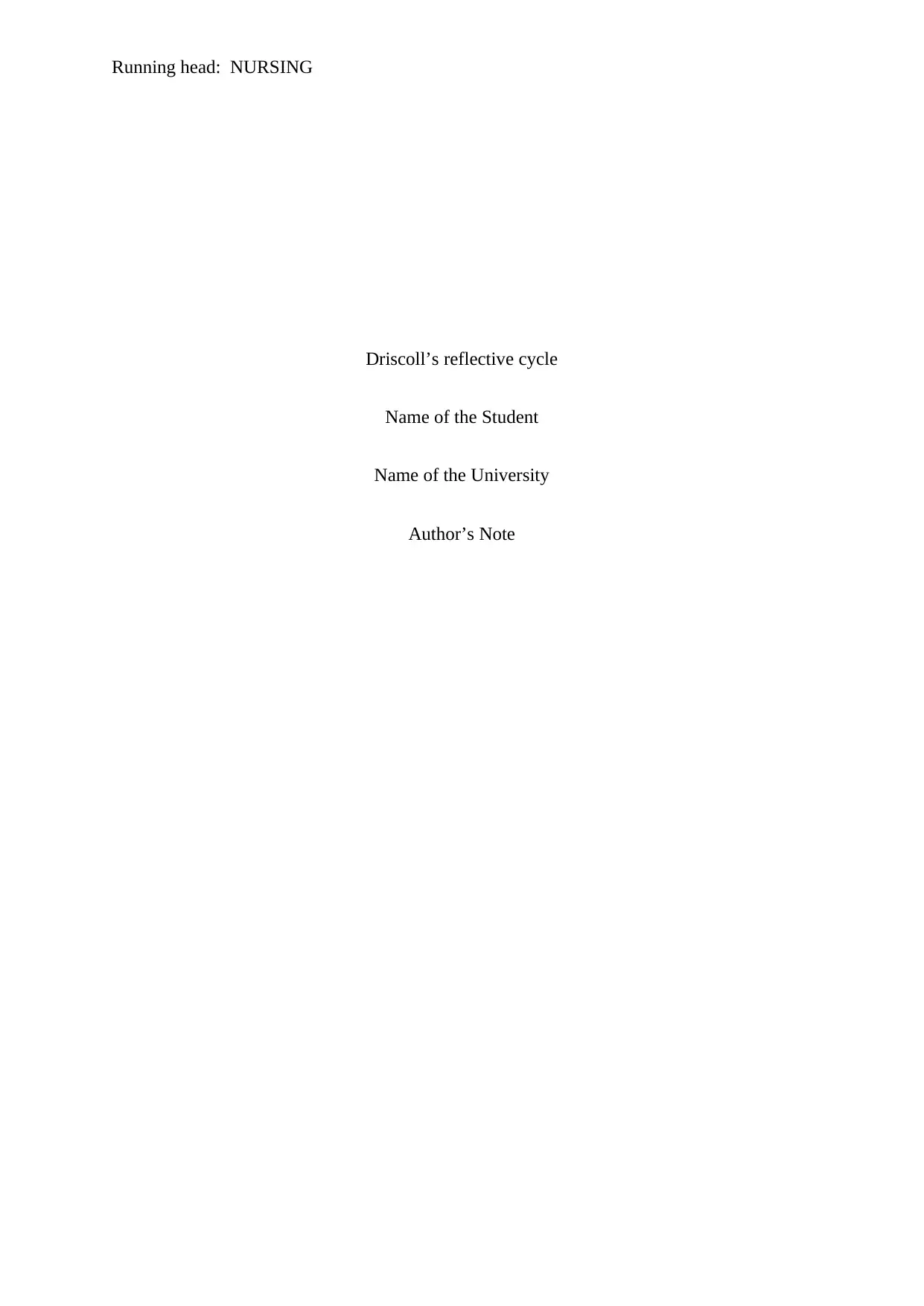
Running head: NURSING
Driscoll’s reflective cycle
Name of the Student
Name of the University
Author’s Note
Driscoll’s reflective cycle
Name of the Student
Name of the University
Author’s Note
Paraphrase This Document
Need a fresh take? Get an instant paraphrase of this document with our AI Paraphraser
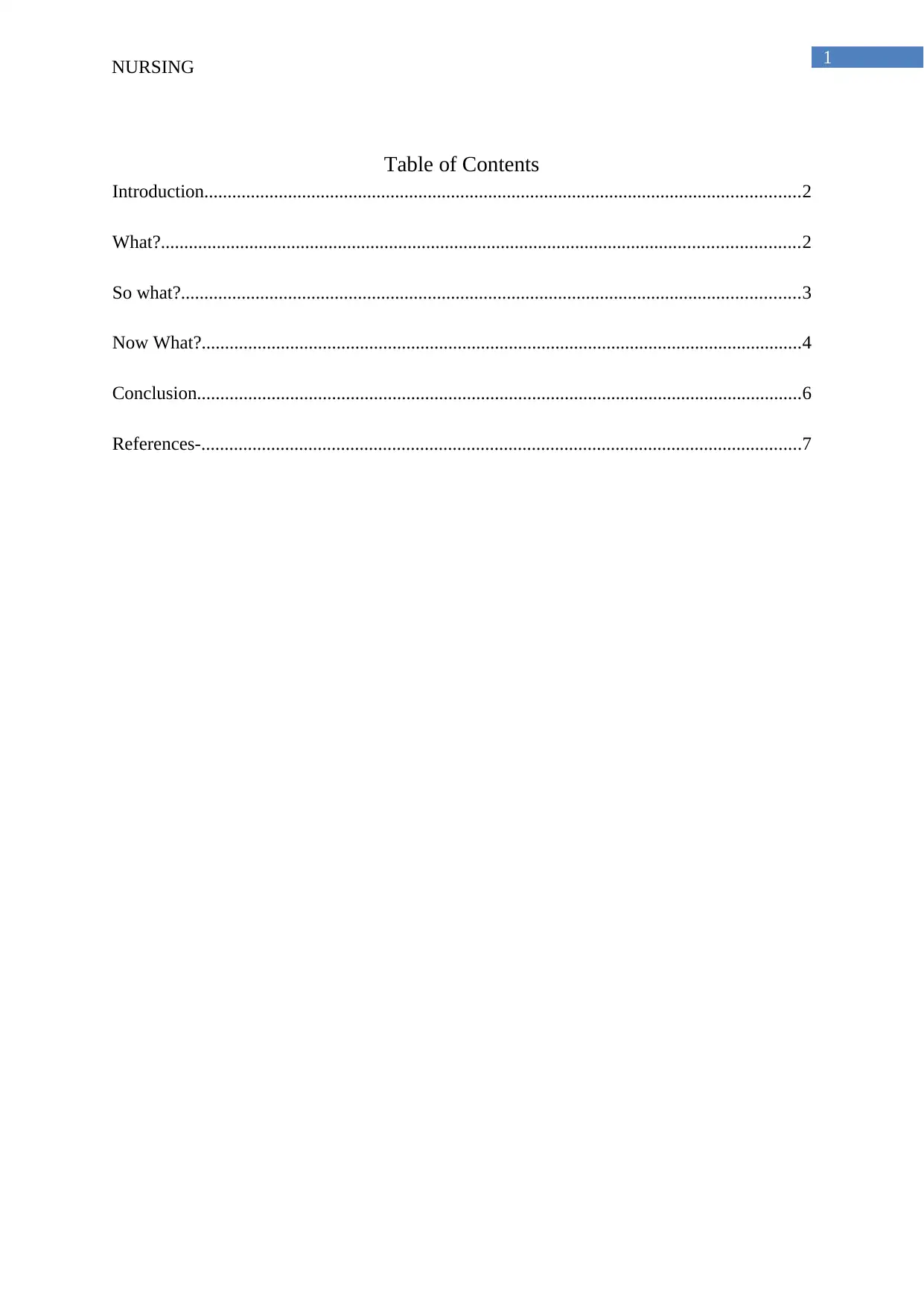
1
NURSING
Table of Contents
Introduction................................................................................................................................2
What?.........................................................................................................................................2
So what?.....................................................................................................................................3
Now What?.................................................................................................................................4
Conclusion..................................................................................................................................6
References-.................................................................................................................................7
NURSING
Table of Contents
Introduction................................................................................................................................2
What?.........................................................................................................................................2
So what?.....................................................................................................................................3
Now What?.................................................................................................................................4
Conclusion..................................................................................................................................6
References-.................................................................................................................................7
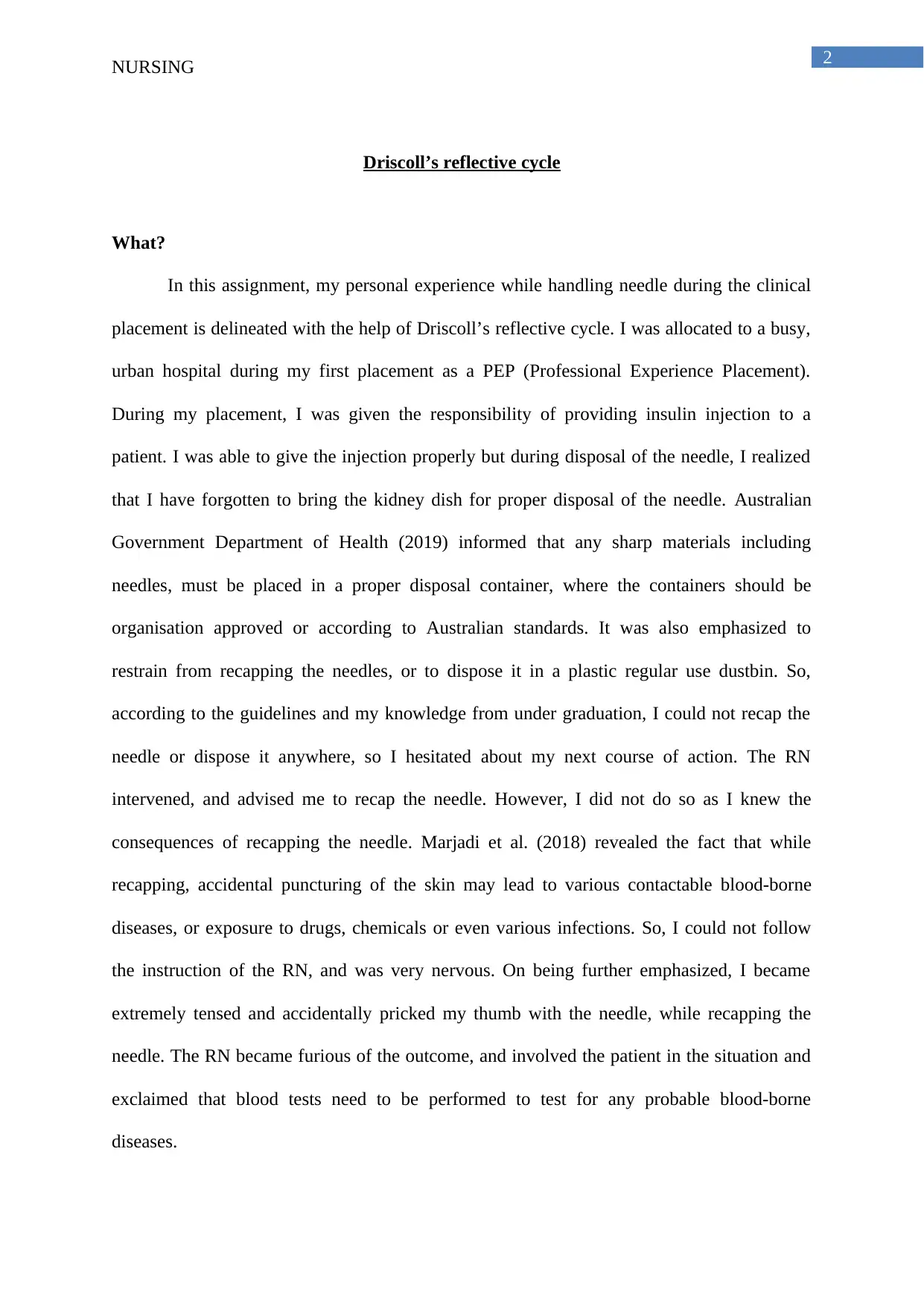
2
NURSING
Driscoll’s reflective cycle
What?
In this assignment, my personal experience while handling needle during the clinical
placement is delineated with the help of Driscoll’s reflective cycle. I was allocated to a busy,
urban hospital during my first placement as a PEP (Professional Experience Placement).
During my placement, I was given the responsibility of providing insulin injection to a
patient. I was able to give the injection properly but during disposal of the needle, I realized
that I have forgotten to bring the kidney dish for proper disposal of the needle. Australian
Government Department of Health (2019) informed that any sharp materials including
needles, must be placed in a proper disposal container, where the containers should be
organisation approved or according to Australian standards. It was also emphasized to
restrain from recapping the needles, or to dispose it in a plastic regular use dustbin. So,
according to the guidelines and my knowledge from under graduation, I could not recap the
needle or dispose it anywhere, so I hesitated about my next course of action. The RN
intervened, and advised me to recap the needle. However, I did not do so as I knew the
consequences of recapping the needle. Marjadi et al. (2018) revealed the fact that while
recapping, accidental puncturing of the skin may lead to various contactable blood-borne
diseases, or exposure to drugs, chemicals or even various infections. So, I could not follow
the instruction of the RN, and was very nervous. On being further emphasized, I became
extremely tensed and accidentally pricked my thumb with the needle, while recapping the
needle. The RN became furious of the outcome, and involved the patient in the situation and
exclaimed that blood tests need to be performed to test for any probable blood-borne
diseases.
NURSING
Driscoll’s reflective cycle
What?
In this assignment, my personal experience while handling needle during the clinical
placement is delineated with the help of Driscoll’s reflective cycle. I was allocated to a busy,
urban hospital during my first placement as a PEP (Professional Experience Placement).
During my placement, I was given the responsibility of providing insulin injection to a
patient. I was able to give the injection properly but during disposal of the needle, I realized
that I have forgotten to bring the kidney dish for proper disposal of the needle. Australian
Government Department of Health (2019) informed that any sharp materials including
needles, must be placed in a proper disposal container, where the containers should be
organisation approved or according to Australian standards. It was also emphasized to
restrain from recapping the needles, or to dispose it in a plastic regular use dustbin. So,
according to the guidelines and my knowledge from under graduation, I could not recap the
needle or dispose it anywhere, so I hesitated about my next course of action. The RN
intervened, and advised me to recap the needle. However, I did not do so as I knew the
consequences of recapping the needle. Marjadi et al. (2018) revealed the fact that while
recapping, accidental puncturing of the skin may lead to various contactable blood-borne
diseases, or exposure to drugs, chemicals or even various infections. So, I could not follow
the instruction of the RN, and was very nervous. On being further emphasized, I became
extremely tensed and accidentally pricked my thumb with the needle, while recapping the
needle. The RN became furious of the outcome, and involved the patient in the situation and
exclaimed that blood tests need to be performed to test for any probable blood-borne
diseases.
⊘ This is a preview!⊘
Do you want full access?
Subscribe today to unlock all pages.

Trusted by 1+ million students worldwide
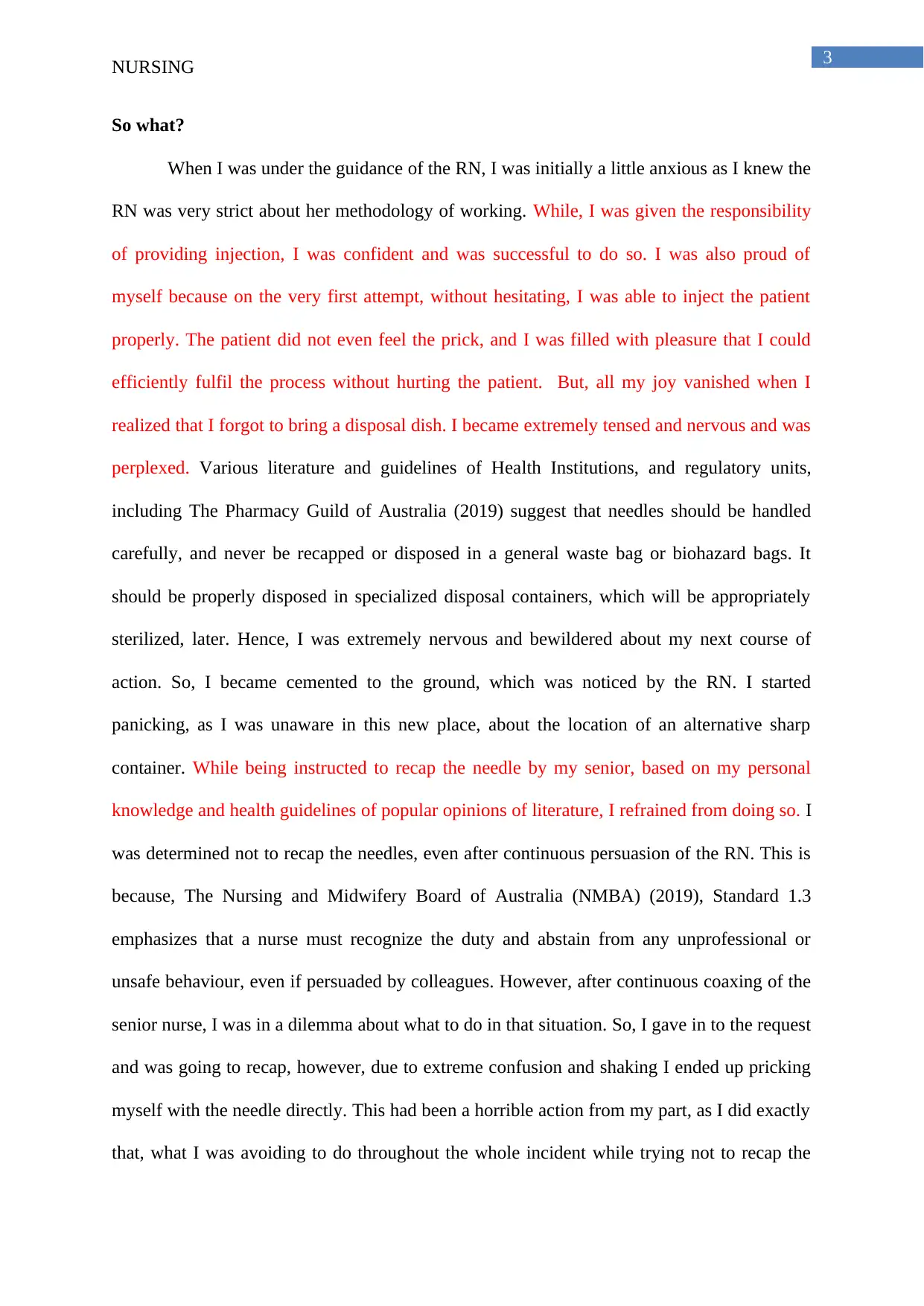
3
NURSING
So what?
When I was under the guidance of the RN, I was initially a little anxious as I knew the
RN was very strict about her methodology of working. While, I was given the responsibility
of providing injection, I was confident and was successful to do so. I was also proud of
myself because on the very first attempt, without hesitating, I was able to inject the patient
properly. The patient did not even feel the prick, and I was filled with pleasure that I could
efficiently fulfil the process without hurting the patient. But, all my joy vanished when I
realized that I forgot to bring a disposal dish. I became extremely tensed and nervous and was
perplexed. Various literature and guidelines of Health Institutions, and regulatory units,
including The Pharmacy Guild of Australia (2019) suggest that needles should be handled
carefully, and never be recapped or disposed in a general waste bag or biohazard bags. It
should be properly disposed in specialized disposal containers, which will be appropriately
sterilized, later. Hence, I was extremely nervous and bewildered about my next course of
action. So, I became cemented to the ground, which was noticed by the RN. I started
panicking, as I was unaware in this new place, about the location of an alternative sharp
container. While being instructed to recap the needle by my senior, based on my personal
knowledge and health guidelines of popular opinions of literature, I refrained from doing so. I
was determined not to recap the needles, even after continuous persuasion of the RN. This is
because, The Nursing and Midwifery Board of Australia (NMBA) (2019), Standard 1.3
emphasizes that a nurse must recognize the duty and abstain from any unprofessional or
unsafe behaviour, even if persuaded by colleagues. However, after continuous coaxing of the
senior nurse, I was in a dilemma about what to do in that situation. So, I gave in to the request
and was going to recap, however, due to extreme confusion and shaking I ended up pricking
myself with the needle directly. This had been a horrible action from my part, as I did exactly
that, what I was avoiding to do throughout the whole incident while trying not to recap the
NURSING
So what?
When I was under the guidance of the RN, I was initially a little anxious as I knew the
RN was very strict about her methodology of working. While, I was given the responsibility
of providing injection, I was confident and was successful to do so. I was also proud of
myself because on the very first attempt, without hesitating, I was able to inject the patient
properly. The patient did not even feel the prick, and I was filled with pleasure that I could
efficiently fulfil the process without hurting the patient. But, all my joy vanished when I
realized that I forgot to bring a disposal dish. I became extremely tensed and nervous and was
perplexed. Various literature and guidelines of Health Institutions, and regulatory units,
including The Pharmacy Guild of Australia (2019) suggest that needles should be handled
carefully, and never be recapped or disposed in a general waste bag or biohazard bags. It
should be properly disposed in specialized disposal containers, which will be appropriately
sterilized, later. Hence, I was extremely nervous and bewildered about my next course of
action. So, I became cemented to the ground, which was noticed by the RN. I started
panicking, as I was unaware in this new place, about the location of an alternative sharp
container. While being instructed to recap the needle by my senior, based on my personal
knowledge and health guidelines of popular opinions of literature, I refrained from doing so. I
was determined not to recap the needles, even after continuous persuasion of the RN. This is
because, The Nursing and Midwifery Board of Australia (NMBA) (2019), Standard 1.3
emphasizes that a nurse must recognize the duty and abstain from any unprofessional or
unsafe behaviour, even if persuaded by colleagues. However, after continuous coaxing of the
senior nurse, I was in a dilemma about what to do in that situation. So, I gave in to the request
and was going to recap, however, due to extreme confusion and shaking I ended up pricking
myself with the needle directly. This had been a horrible action from my part, as I did exactly
that, what I was avoiding to do throughout the whole incident while trying not to recap the
Paraphrase This Document
Need a fresh take? Get an instant paraphrase of this document with our AI Paraphraser
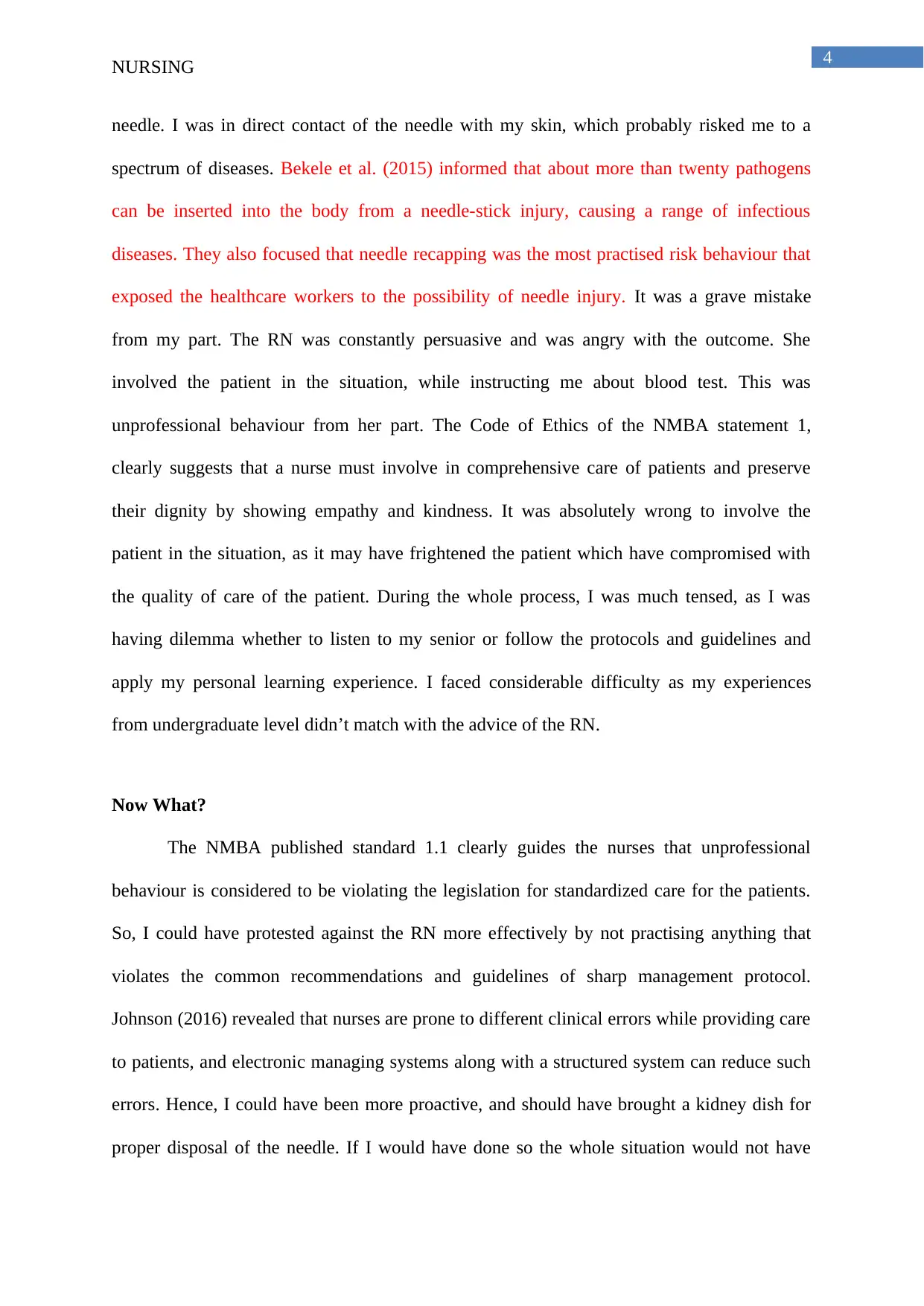
4
NURSING
needle. I was in direct contact of the needle with my skin, which probably risked me to a
spectrum of diseases. Bekele et al. (2015) informed that about more than twenty pathogens
can be inserted into the body from a needle-stick injury, causing a range of infectious
diseases. They also focused that needle recapping was the most practised risk behaviour that
exposed the healthcare workers to the possibility of needle injury. It was a grave mistake
from my part. The RN was constantly persuasive and was angry with the outcome. She
involved the patient in the situation, while instructing me about blood test. This was
unprofessional behaviour from her part. The Code of Ethics of the NMBA statement 1,
clearly suggests that a nurse must involve in comprehensive care of patients and preserve
their dignity by showing empathy and kindness. It was absolutely wrong to involve the
patient in the situation, as it may have frightened the patient which have compromised with
the quality of care of the patient. During the whole process, I was much tensed, as I was
having dilemma whether to listen to my senior or follow the protocols and guidelines and
apply my personal learning experience. I faced considerable difficulty as my experiences
from undergraduate level didn’t match with the advice of the RN.
Now What?
The NMBA published standard 1.1 clearly guides the nurses that unprofessional
behaviour is considered to be violating the legislation for standardized care for the patients.
So, I could have protested against the RN more effectively by not practising anything that
violates the common recommendations and guidelines of sharp management protocol.
Johnson (2016) revealed that nurses are prone to different clinical errors while providing care
to patients, and electronic managing systems along with a structured system can reduce such
errors. Hence, I could have been more proactive, and should have brought a kidney dish for
proper disposal of the needle. If I would have done so the whole situation would not have
NURSING
needle. I was in direct contact of the needle with my skin, which probably risked me to a
spectrum of diseases. Bekele et al. (2015) informed that about more than twenty pathogens
can be inserted into the body from a needle-stick injury, causing a range of infectious
diseases. They also focused that needle recapping was the most practised risk behaviour that
exposed the healthcare workers to the possibility of needle injury. It was a grave mistake
from my part. The RN was constantly persuasive and was angry with the outcome. She
involved the patient in the situation, while instructing me about blood test. This was
unprofessional behaviour from her part. The Code of Ethics of the NMBA statement 1,
clearly suggests that a nurse must involve in comprehensive care of patients and preserve
their dignity by showing empathy and kindness. It was absolutely wrong to involve the
patient in the situation, as it may have frightened the patient which have compromised with
the quality of care of the patient. During the whole process, I was much tensed, as I was
having dilemma whether to listen to my senior or follow the protocols and guidelines and
apply my personal learning experience. I faced considerable difficulty as my experiences
from undergraduate level didn’t match with the advice of the RN.
Now What?
The NMBA published standard 1.1 clearly guides the nurses that unprofessional
behaviour is considered to be violating the legislation for standardized care for the patients.
So, I could have protested against the RN more effectively by not practising anything that
violates the common recommendations and guidelines of sharp management protocol.
Johnson (2016) revealed that nurses are prone to different clinical errors while providing care
to patients, and electronic managing systems along with a structured system can reduce such
errors. Hence, I could have been more proactive, and should have brought a kidney dish for
proper disposal of the needle. If I would have done so the whole situation would not have
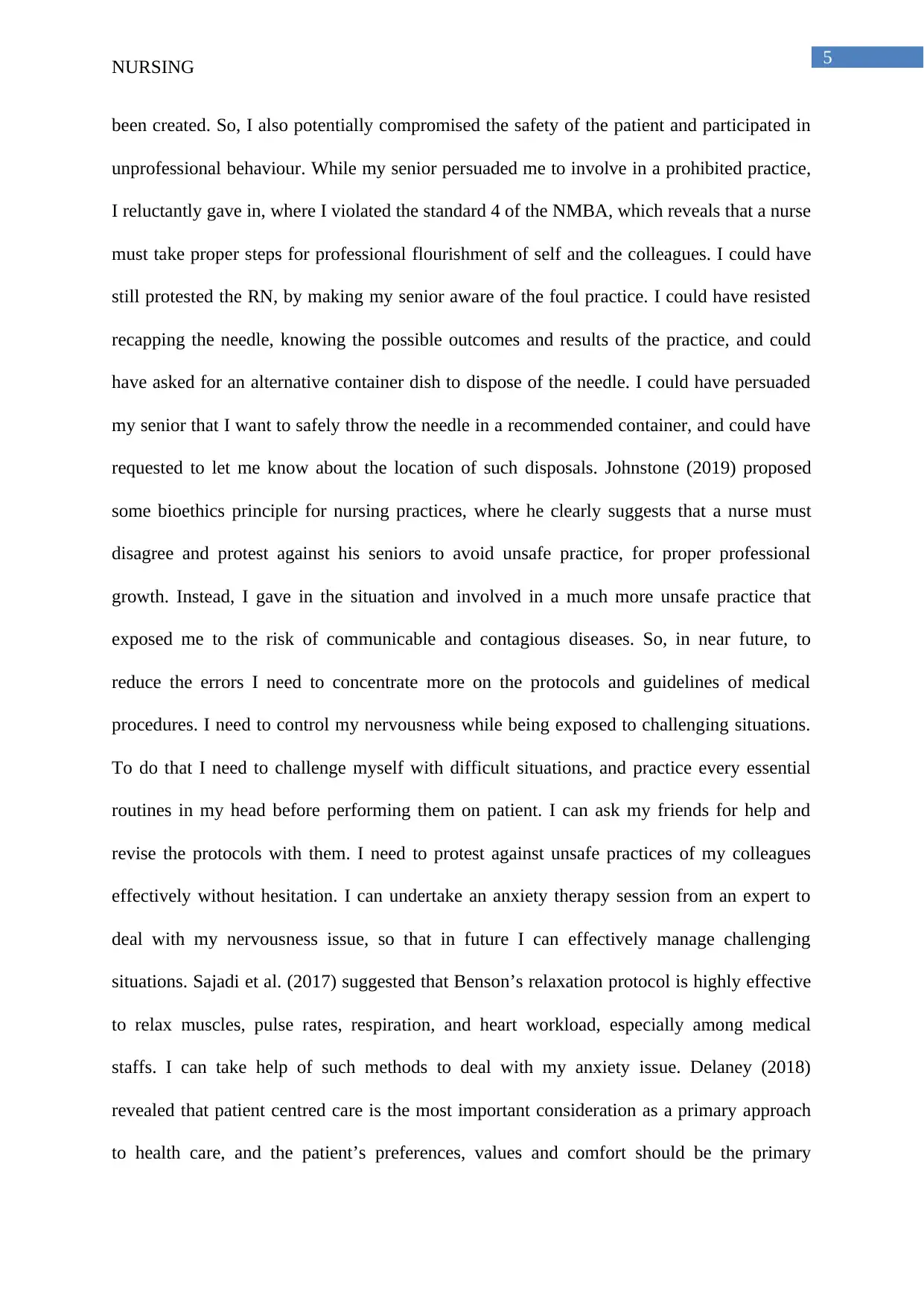
5
NURSING
been created. So, I also potentially compromised the safety of the patient and participated in
unprofessional behaviour. While my senior persuaded me to involve in a prohibited practice,
I reluctantly gave in, where I violated the standard 4 of the NMBA, which reveals that a nurse
must take proper steps for professional flourishment of self and the colleagues. I could have
still protested the RN, by making my senior aware of the foul practice. I could have resisted
recapping the needle, knowing the possible outcomes and results of the practice, and could
have asked for an alternative container dish to dispose of the needle. I could have persuaded
my senior that I want to safely throw the needle in a recommended container, and could have
requested to let me know about the location of such disposals. Johnstone (2019) proposed
some bioethics principle for nursing practices, where he clearly suggests that a nurse must
disagree and protest against his seniors to avoid unsafe practice, for proper professional
growth. Instead, I gave in the situation and involved in a much more unsafe practice that
exposed me to the risk of communicable and contagious diseases. So, in near future, to
reduce the errors I need to concentrate more on the protocols and guidelines of medical
procedures. I need to control my nervousness while being exposed to challenging situations.
To do that I need to challenge myself with difficult situations, and practice every essential
routines in my head before performing them on patient. I can ask my friends for help and
revise the protocols with them. I need to protest against unsafe practices of my colleagues
effectively without hesitation. I can undertake an anxiety therapy session from an expert to
deal with my nervousness issue, so that in future I can effectively manage challenging
situations. Sajadi et al. (2017) suggested that Benson’s relaxation protocol is highly effective
to relax muscles, pulse rates, respiration, and heart workload, especially among medical
staffs. I can take help of such methods to deal with my anxiety issue. Delaney (2018)
revealed that patient centred care is the most important consideration as a primary approach
to health care, and the patient’s preferences, values and comfort should be the primary
NURSING
been created. So, I also potentially compromised the safety of the patient and participated in
unprofessional behaviour. While my senior persuaded me to involve in a prohibited practice,
I reluctantly gave in, where I violated the standard 4 of the NMBA, which reveals that a nurse
must take proper steps for professional flourishment of self and the colleagues. I could have
still protested the RN, by making my senior aware of the foul practice. I could have resisted
recapping the needle, knowing the possible outcomes and results of the practice, and could
have asked for an alternative container dish to dispose of the needle. I could have persuaded
my senior that I want to safely throw the needle in a recommended container, and could have
requested to let me know about the location of such disposals. Johnstone (2019) proposed
some bioethics principle for nursing practices, where he clearly suggests that a nurse must
disagree and protest against his seniors to avoid unsafe practice, for proper professional
growth. Instead, I gave in the situation and involved in a much more unsafe practice that
exposed me to the risk of communicable and contagious diseases. So, in near future, to
reduce the errors I need to concentrate more on the protocols and guidelines of medical
procedures. I need to control my nervousness while being exposed to challenging situations.
To do that I need to challenge myself with difficult situations, and practice every essential
routines in my head before performing them on patient. I can ask my friends for help and
revise the protocols with them. I need to protest against unsafe practices of my colleagues
effectively without hesitation. I can undertake an anxiety therapy session from an expert to
deal with my nervousness issue, so that in future I can effectively manage challenging
situations. Sajadi et al. (2017) suggested that Benson’s relaxation protocol is highly effective
to relax muscles, pulse rates, respiration, and heart workload, especially among medical
staffs. I can take help of such methods to deal with my anxiety issue. Delaney (2018)
revealed that patient centred care is the most important consideration as a primary approach
to health care, and the patient’s preferences, values and comfort should be the primary
⊘ This is a preview!⊘
Do you want full access?
Subscribe today to unlock all pages.

Trusted by 1+ million students worldwide
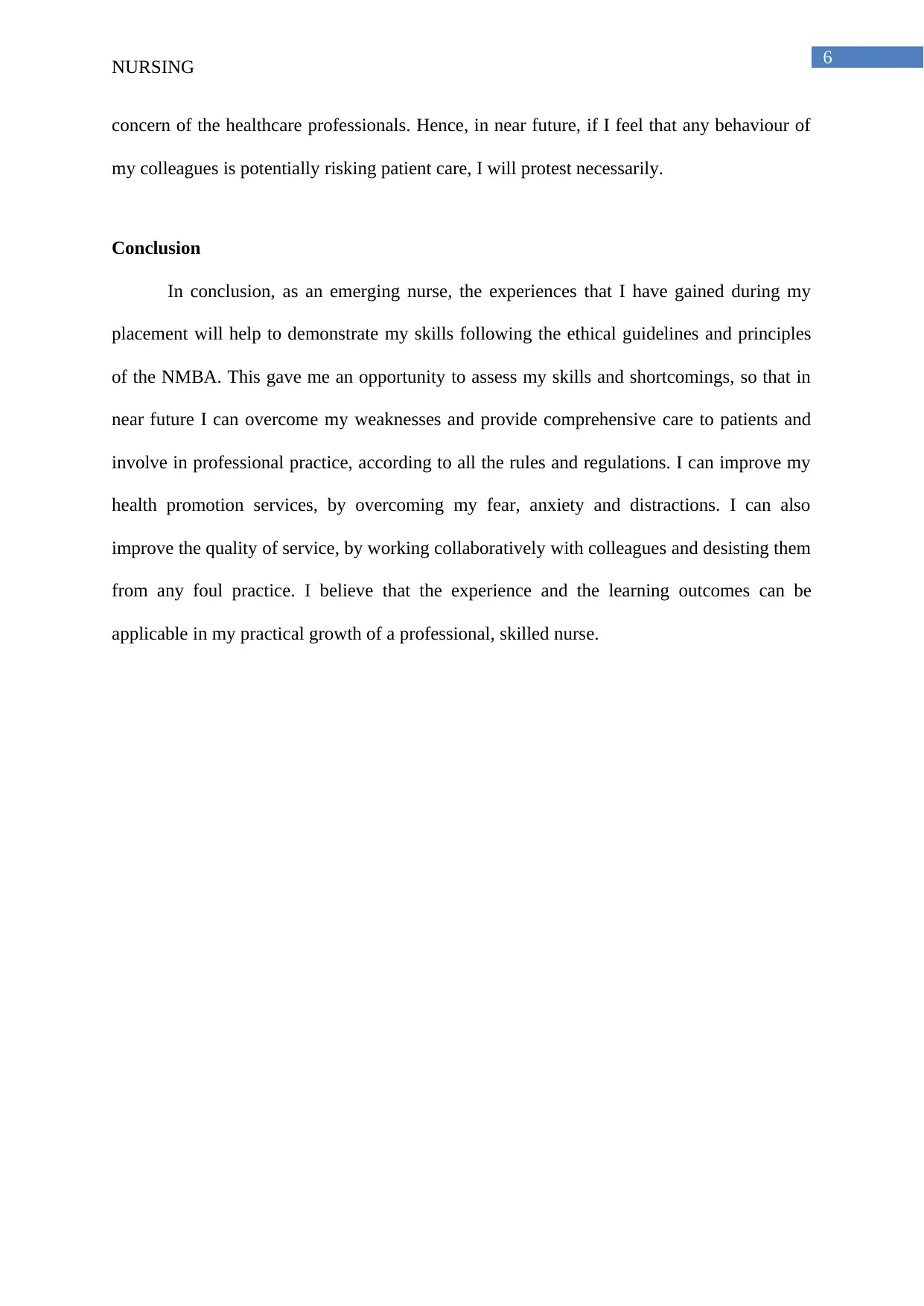
6
NURSING
concern of the healthcare professionals. Hence, in near future, if I feel that any behaviour of
my colleagues is potentially risking patient care, I will protest necessarily.
Conclusion
In conclusion, as an emerging nurse, the experiences that I have gained during my
placement will help to demonstrate my skills following the ethical guidelines and principles
of the NMBA. This gave me an opportunity to assess my skills and shortcomings, so that in
near future I can overcome my weaknesses and provide comprehensive care to patients and
involve in professional practice, according to all the rules and regulations. I can improve my
health promotion services, by overcoming my fear, anxiety and distractions. I can also
improve the quality of service, by working collaboratively with colleagues and desisting them
from any foul practice. I believe that the experience and the learning outcomes can be
applicable in my practical growth of a professional, skilled nurse.
NURSING
concern of the healthcare professionals. Hence, in near future, if I feel that any behaviour of
my colleagues is potentially risking patient care, I will protest necessarily.
Conclusion
In conclusion, as an emerging nurse, the experiences that I have gained during my
placement will help to demonstrate my skills following the ethical guidelines and principles
of the NMBA. This gave me an opportunity to assess my skills and shortcomings, so that in
near future I can overcome my weaknesses and provide comprehensive care to patients and
involve in professional practice, according to all the rules and regulations. I can improve my
health promotion services, by overcoming my fear, anxiety and distractions. I can also
improve the quality of service, by working collaboratively with colleagues and desisting them
from any foul practice. I believe that the experience and the learning outcomes can be
applicable in my practical growth of a professional, skilled nurse.
Paraphrase This Document
Need a fresh take? Get an instant paraphrase of this document with our AI Paraphraser
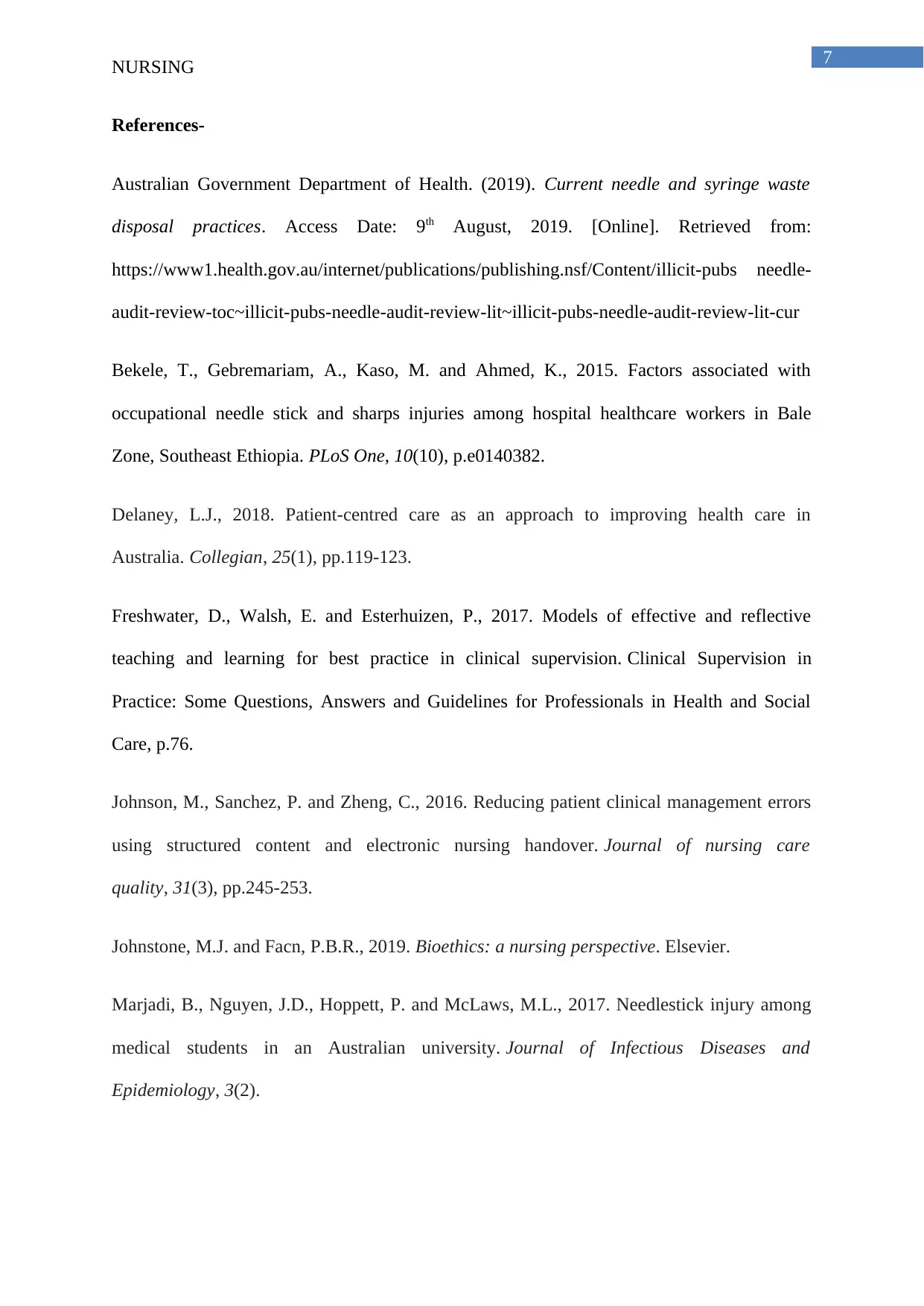
7
NURSING
References-
Australian Government Department of Health. (2019). Current needle and syringe waste
disposal practices. Access Date: 9th August, 2019. [Online]. Retrieved from:
https://www1.health.gov.au/internet/publications/publishing.nsf/Content/illicit-pubs needle-
audit-review-toc~illicit-pubs-needle-audit-review-lit~illicit-pubs-needle-audit-review-lit-cur
Bekele, T., Gebremariam, A., Kaso, M. and Ahmed, K., 2015. Factors associated with
occupational needle stick and sharps injuries among hospital healthcare workers in Bale
Zone, Southeast Ethiopia. PLoS One, 10(10), p.e0140382.
Delaney, L.J., 2018. Patient-centred care as an approach to improving health care in
Australia. Collegian, 25(1), pp.119-123.
Freshwater, D., Walsh, E. and Esterhuizen, P., 2017. Models of effective and reflective
teaching and learning for best practice in clinical supervision. Clinical Supervision in
Practice: Some Questions, Answers and Guidelines for Professionals in Health and Social
Care, p.76.
Johnson, M., Sanchez, P. and Zheng, C., 2016. Reducing patient clinical management errors
using structured content and electronic nursing handover. Journal of nursing care
quality, 31(3), pp.245-253.
Johnstone, M.J. and Facn, P.B.R., 2019. Bioethics: a nursing perspective. Elsevier.
Marjadi, B., Nguyen, J.D., Hoppett, P. and McLaws, M.L., 2017. Needlestick injury among
medical students in an Australian university. Journal of Infectious Diseases and
Epidemiology, 3(2).
NURSING
References-
Australian Government Department of Health. (2019). Current needle and syringe waste
disposal practices. Access Date: 9th August, 2019. [Online]. Retrieved from:
https://www1.health.gov.au/internet/publications/publishing.nsf/Content/illicit-pubs needle-
audit-review-toc~illicit-pubs-needle-audit-review-lit~illicit-pubs-needle-audit-review-lit-cur
Bekele, T., Gebremariam, A., Kaso, M. and Ahmed, K., 2015. Factors associated with
occupational needle stick and sharps injuries among hospital healthcare workers in Bale
Zone, Southeast Ethiopia. PLoS One, 10(10), p.e0140382.
Delaney, L.J., 2018. Patient-centred care as an approach to improving health care in
Australia. Collegian, 25(1), pp.119-123.
Freshwater, D., Walsh, E. and Esterhuizen, P., 2017. Models of effective and reflective
teaching and learning for best practice in clinical supervision. Clinical Supervision in
Practice: Some Questions, Answers and Guidelines for Professionals in Health and Social
Care, p.76.
Johnson, M., Sanchez, P. and Zheng, C., 2016. Reducing patient clinical management errors
using structured content and electronic nursing handover. Journal of nursing care
quality, 31(3), pp.245-253.
Johnstone, M.J. and Facn, P.B.R., 2019. Bioethics: a nursing perspective. Elsevier.
Marjadi, B., Nguyen, J.D., Hoppett, P. and McLaws, M.L., 2017. Needlestick injury among
medical students in an Australian university. Journal of Infectious Diseases and
Epidemiology, 3(2).
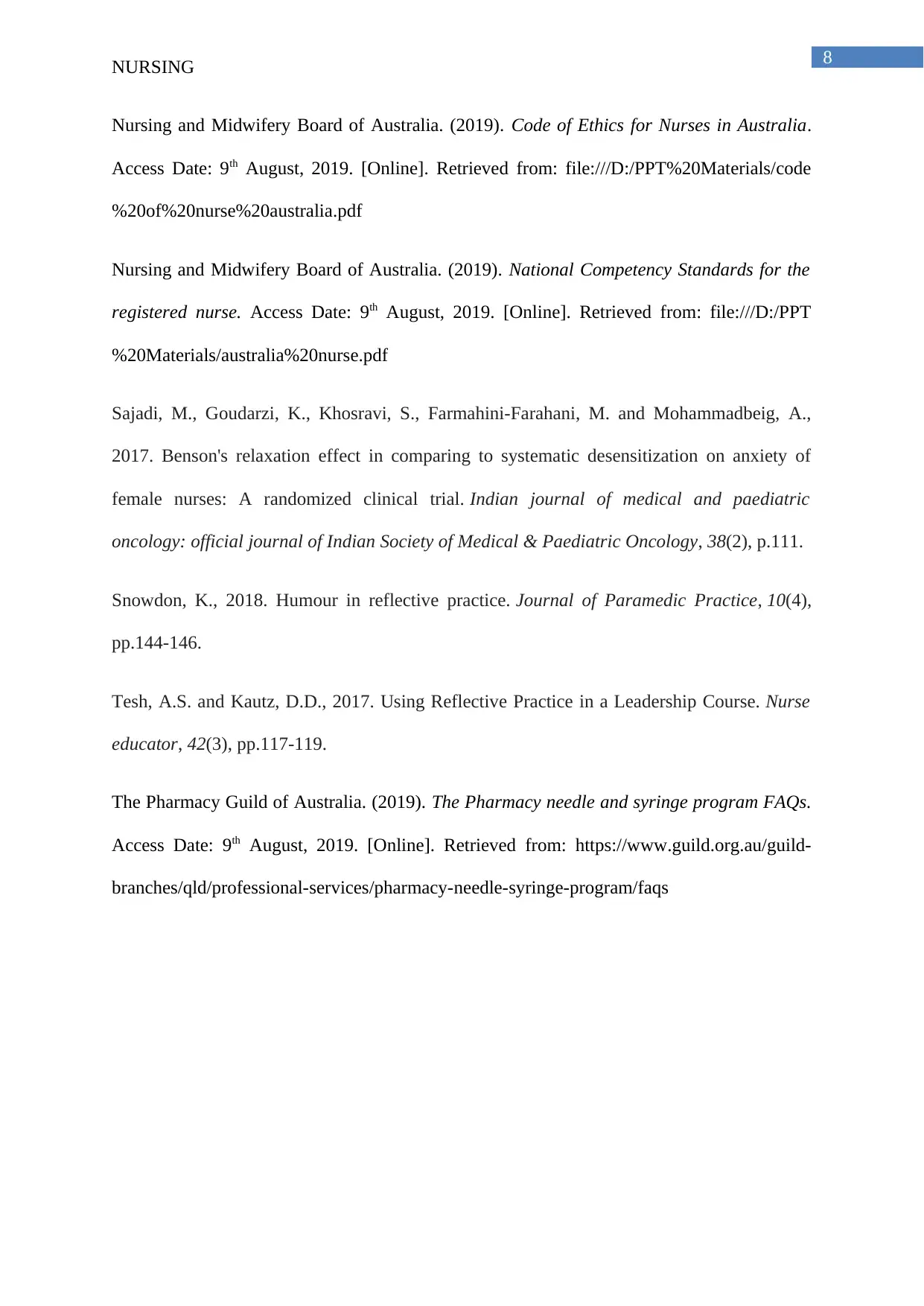
8
NURSING
Nursing and Midwifery Board of Australia. (2019). Code of Ethics for Nurses in Australia.
Access Date: 9th August, 2019. [Online]. Retrieved from: file:///D:/PPT%20Materials/code
%20of%20nurse%20australia.pdf
Nursing and Midwifery Board of Australia. (2019). National Competency Standards for the
registered nurse. Access Date: 9th August, 2019. [Online]. Retrieved from: file:///D:/PPT
%20Materials/australia%20nurse.pdf
Sajadi, M., Goudarzi, K., Khosravi, S., Farmahini-Farahani, M. and Mohammadbeig, A.,
2017. Benson's relaxation effect in comparing to systematic desensitization on anxiety of
female nurses: A randomized clinical trial. Indian journal of medical and paediatric
oncology: official journal of Indian Society of Medical & Paediatric Oncology, 38(2), p.111.
Snowdon, K., 2018. Humour in reflective practice. Journal of Paramedic Practice, 10(4),
pp.144-146.
Tesh, A.S. and Kautz, D.D., 2017. Using Reflective Practice in a Leadership Course. Nurse
educator, 42(3), pp.117-119.
The Pharmacy Guild of Australia. (2019). The Pharmacy needle and syringe program FAQs.
Access Date: 9th August, 2019. [Online]. Retrieved from: https://www.guild.org.au/guild-
branches/qld/professional-services/pharmacy-needle-syringe-program/faqs
NURSING
Nursing and Midwifery Board of Australia. (2019). Code of Ethics for Nurses in Australia.
Access Date: 9th August, 2019. [Online]. Retrieved from: file:///D:/PPT%20Materials/code
%20of%20nurse%20australia.pdf
Nursing and Midwifery Board of Australia. (2019). National Competency Standards for the
registered nurse. Access Date: 9th August, 2019. [Online]. Retrieved from: file:///D:/PPT
%20Materials/australia%20nurse.pdf
Sajadi, M., Goudarzi, K., Khosravi, S., Farmahini-Farahani, M. and Mohammadbeig, A.,
2017. Benson's relaxation effect in comparing to systematic desensitization on anxiety of
female nurses: A randomized clinical trial. Indian journal of medical and paediatric
oncology: official journal of Indian Society of Medical & Paediatric Oncology, 38(2), p.111.
Snowdon, K., 2018. Humour in reflective practice. Journal of Paramedic Practice, 10(4),
pp.144-146.
Tesh, A.S. and Kautz, D.D., 2017. Using Reflective Practice in a Leadership Course. Nurse
educator, 42(3), pp.117-119.
The Pharmacy Guild of Australia. (2019). The Pharmacy needle and syringe program FAQs.
Access Date: 9th August, 2019. [Online]. Retrieved from: https://www.guild.org.au/guild-
branches/qld/professional-services/pharmacy-needle-syringe-program/faqs
⊘ This is a preview!⊘
Do you want full access?
Subscribe today to unlock all pages.

Trusted by 1+ million students worldwide
1 out of 9
Related Documents
Your All-in-One AI-Powered Toolkit for Academic Success.
+13062052269
info@desklib.com
Available 24*7 on WhatsApp / Email
![[object Object]](/_next/static/media/star-bottom.7253800d.svg)
Unlock your academic potential
Copyright © 2020–2026 A2Z Services. All Rights Reserved. Developed and managed by ZUCOL.





